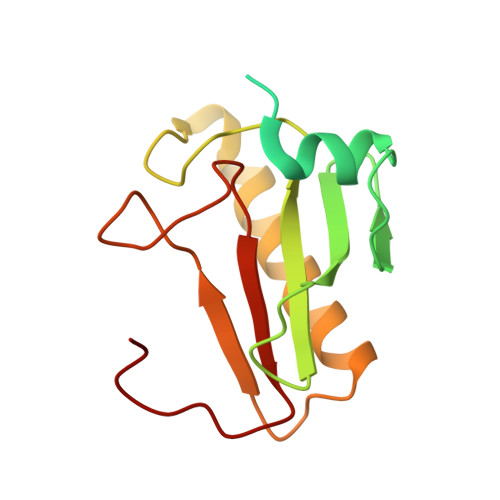Biochemical, crystallographic and biophysical characterization of histidine triad nucleotide-binding protein 2 with different ligands including a non-hydrolyzable analog of Ap4A.
Dolot, R., Krakowiak, A., Kaczmarek, R., Wlodarczyk, A., Pichlak, M., Nawrot, B.(2021) Biochim Biophys Acta Gen Subj 1865: 129968-129968
- PubMed: 34329705
- DOI: https://doi.org/10.1016/j.bbagen.2021.129968
- Primary Citation of Related Structures:
6YI0, 6YPR, 6YPX, 6YQD, 6YQM, 6YVP - PubMed Abstract:
Human HINT2 is an important mitochondrial enzyme involved in many processes such as apoptosis and bioenergetics, but its endogenous substrates and the three-dimensional structure of the full-length protein have not been identified yet. An HPLC assay was used to test the hydrolytic activity of HINT2 against various adenosine, guanosine, and 2'-deoxyguanosine derivatives containing phosphate bonds of different types and different leaving groups. Data on binding affinity were obtained by microscale thermophoresis (MST). Crystal structures of HINT2, in its apo form and with a dGMP ligand, were resolved to atomic resolution. HINT2 substrate specificity was similar to that of HINT1, but with the major exception of remarkable discrimination against substrates lacking the 2'-hydroxyl group. The biochemical results were consistent with binding affinity measurements. They showed a similar binding strength of AMP and GMP to HINT2, and much weaker binding of dGMP, in contrast to HINT1. A non-hydrolyzable analog of Ap4A (JB419) interacted with both proteins with similar K d and Ap4A is the signaling molecule that can interact with hHINT1 and regulate the activity of some transcription factors. Several forms of homo- and heterodimers of different lengths of N-terminally truncated polypeptides resulting from degradation of the full-length protein were described. Ser144 in HINT2 appeared to be functionally equivalent to Ser107 in HINT1 by supporting the protonation of the leaving group in the hydrolytic mechanism of HINT2. Our results should be considered in future studies on the natural function of HINT2 and its role in nucleotide prodrug processing.
- Centre of Molecular and Macromolecular Studies, Polish Academy of Sciences, Sienkiewicza 112, 90-363 Lodz, Poland. Electronic address: rdolot@cbmm.lodz.pl.
Organizational Affiliation:

















